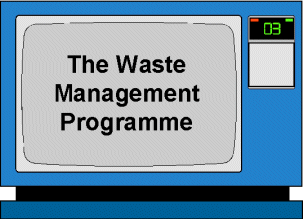| Waste Management Programmes | |
| |

|
Waste minimisation is the central theme of a waste management strategy. Implementing this however can also highlight legal compliance issues and reduce risks, i.e. investigating the use and disposal of materials inevitably leads to consideration of the type of materials used, "can we use less a less hazardous material?" and whether storage and transport of materials on site is efficient and safe. An integrated waste management strategy will encompass both minimisation and control elements. |
| Task 2: | Before continuing, list as many of the benefits of a waste management programme that you can think of. |
|
The next section provides a summary of the benefits that companies who have taken part in Waste Management programmes feel they have gained. |
|
| Benefits of Waste Management |
|
|
Cost Savings, improved throughput, reduced risk & liability, Improved environmental performance
|